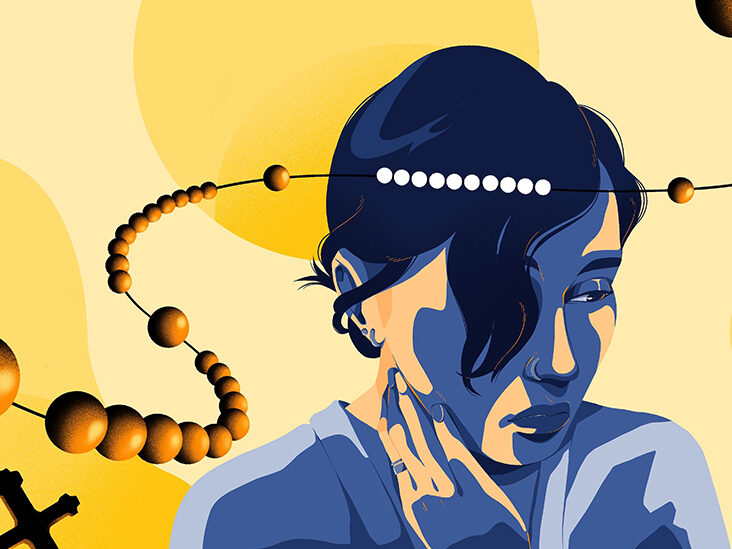Do you have obsessive thoughts about being a bad person? Are you constantly worried that you have done something wrong, even when there is no evidence to support this fear? If so, you may be struggling with scrupulosity OCD. This type of OCD is characterized by intrusive thoughts and worries about morality and religious beliefs. In this blog post, we will discuss the symptoms, treatment, and coping strategies for scrupulosity OCD.
Contents
What Is Scrupulosity OCD?
 Scrupulosity OCD is a subtype of OCD characterized by religious or moral obsessions and compulsions. People with this type of OCD are often consumed by thoughts of sinning or committing an ethical transgression. They may also worry about offending God or causing harm to others. As a result, they may perform excessive rituals and compulsions in an attempt to prevent these feared outcomes.
Scrupulosity OCD is a subtype of OCD characterized by religious or moral obsessions and compulsions. People with this type of OCD are often consumed by thoughts of sinning or committing an ethical transgression. They may also worry about offending God or causing harm to others. As a result, they may perform excessive rituals and compulsions in an attempt to prevent these feared outcomes.
More often, it is the condition where a person’s own morality causes them distress. For example, they might worry that they have not been ‘good enough’ or have done something ‘bad’. This can lead to compulsions such as prayer or confession.
Some people with scrupulosity OCD also become excessively involved in helping others and volunteering. Or even over-donating to charity in an attempt to make up for their perceived ‘wrongdoing’.
Moreover, the term scrupulosity is first and foremost used in reference to religious obsessiveness and compulsions. It is derived from the Latin word for ‘scruple’, which refers to a small unit of measure. In other words, scrupulosity OCD is a condition where someone is excessively worried about doing something ‘wrong’ or sinful. It is first used by Roman Catholic theologians in the 16th century to describe people who were overly conscientious about their religious duties.
Two Types Of Scrupulosity OCD?
There are two types of scrupulosity OCD: religious and moral.
People with religious scrupulosity obsess over whether they have sinned or are offending God in some way. They may worry about saying prayers correctly or committing blasphemy. In fact, they might avoid certain activities for fear of sinning, like using profanity or having premarital sex. Moreover, people with religious scrupulosity OCD often doubt their salvation.
On the other hand, people with moral scrupulosity obsess over whether they have done something morally wrong. They might worry about harming others, even if it’s accidental. They may avoid activities for fear of causing harm, like driving or using power tools. People with moral scrupulosity OCD often doubt their goodness as a person.
It’s important to note that you can have scrupulosity OCD without being religious or moral. You may worry about following rules or doing things “right.” For example, you may be afraid of making a mistake at work or school.
No matter what type of scrupulosity OCD you have, it can be debilitating. The good news is that there are treatments that can help. And cause a lot of distress. It is important to know the symptoms in order to get the proper help.
Signs And Symptoms Of Scrupulosity OCD
 Scrupulosity OCD is marked by an excessive focus on religious or moral issues. People with this condition may have a fear of Hell or damnation if they violate their beliefs. And they may spend excessive time praying or confessing their “sins.” They may also avoid people or places that they believe are sinful. Other common symptoms include:
Scrupulosity OCD is marked by an excessive focus on religious or moral issues. People with this condition may have a fear of Hell or damnation if they violate their beliefs. And they may spend excessive time praying or confessing their “sins.” They may also avoid people or places that they believe are sinful. Other common symptoms include:
- Extreme perfectionism
- Rigid thinking
- Inflexible morality
- Intolerance of ambiguity
- Preoccupation with right and wrong
- Fear of making mistakes
- Doubting one’s own actions and motives
- Seeking reassurance from others
In this, obsessions can take many different forms. It can be in the form of thoughts, urges, and doubts over and over again. And compulsions are the repetitive behaviors or mental acts that a person feels compelled to do in response to an obsession. The compulsions are usually an attempt to reduce the anxiety caused by the obsessions.
Compulsions related to scrupulosity can take many different forms as well. They may include:
- Praying excessively
- Confessing one’s “sins” over and over
- Avoiding people or places that are seen as sinful
- Checking and rechecking religious texts for guidance
- Repeating certain prayers or rituals multiple times
- Asking others for reassurance about one’s actions or beliefs
- Trying to achieve perfection in all areas of life
It is important to be aware of these symptoms so that you can seek professional help if necessary. If you are struggling with any of these symptoms, please reach out to a mental health professional for assistance.
What Are The Causes Of Scrupulosity OCD?
The causes of scrupulosity OCD are not fully known, but it is thought to develop from a combination of genetic and environmental factors. There may be a link between scrupulosity OCD and other types of OCD. Such as contamination OCD or hoarding OCD.
Family members with OCD may also be more likely to develop scrupulosity OCD. And, people who are raised in strict religious environments may be more susceptible to developing this type of OCD. Although, it is important to note that scrupulosity OCD can occur in people of any faith or no faith at all.
Moreover, the exact cause of scrupulosity OCD is still unknown. However, the causes of this OCD make it clear that it does not develop overnight. It is a result of various environmental and genetic factors. So, the impacts of scrupulosity OCD can be far-reaching. For example, people with scrupulosity OCD may avoid social situations. And, they may also have difficulty keeping a job or maintaining healthy relationships.
Also, the types of intrusive thoughts and triggers can vary from person to person. But, they often center around themes of religion or morality. For instance, a person with scrupulosity OCD may have intrusive thoughts about committing blasphemy. Or, they may worry that they will go to hell if they don’t follow certain religious rules.
What Are The Treatments For Scrupulosity OCD?
 It is essential to seek professional help if you think you may have scrupulosity OCD. A mental health professional can give you an accurate diagnosis and develop a treatment plan that is right for you.
It is essential to seek professional help if you think you may have scrupulosity OCD. A mental health professional can give you an accurate diagnosis and develop a treatment plan that is right for you.
There are many different types of treatments available for scrupulosity OCD such as;
Consider Therapies
Therapies are believed to be the most effective treatment for OCD. They can provide you with the tools and skills you need to manage your OCD symptoms.
Some of the most common types of therapies used to treat scrupulosity OCD include;
- Cognitive-behavioral therapy (CBT): CBT is a type of therapy that helps you change your thoughts and behaviors. It can be very helpful in treating scrupulosity OCD.
- Exposure and response prevention (ERP): ERP is a type of CBT that involves exposure to your triggers or fears without engaging in compulsions or avoidance behaviors. This can help reduce your anxiety and improve your overall functioning.
These two are the most impactful therapies when treating scrupulosity OCD. However, there are many other types of therapies that can also be helpful. If you think you may have scrupulosity OCD, reach out to a mental health professional to discuss your treatment options.
You can get help with Mantra Care, a platform that provides counselors and therapists to people who think they may have OCD. With the help of a professional, you can develop a treatment plan that is right for you. First, you can book your free consultation in order to get started.
Medications
There are no specific medications that are FDA-approved for the treatment of scrupulosity OCD. However, certain medications can be helpful in managing your symptoms. Some of these medications used to treat scrupulosity OCD include;
- Selective serotonin reuptake inhibitors (SSRIs): SSRIs are a type of antidepressant that can help reduce your anxiety and obsessive thoughts.
- Serotonin and norepinephrine reuptake inhibitors (SNRIs): SNRIs are a type of antidepressant that can help reduce your anxiety and improve your mood.
These medications can be very helpful in managing the symptoms of scrupulosity OCD. However, it is important to talk to your doctor about the risks and benefits of these medications before starting any new medication.
Moreover, therapists themselves sometimes also recommend medications to their patients as a part of treating scrupulosity OCD. And the combination of both medication and therapy has shown to be the most effective in treating OCD.
Self-Help Techniques
 This is the prominent thing you must focus upon. Because if you don’t have the will to help yourself, no one can. While there is no cure for this condition, there are many things you can do to manage your symptoms and live a healthy and happy life.
This is the prominent thing you must focus upon. Because if you don’t have the will to help yourself, no one can. While there is no cure for this condition, there are many things you can do to manage your symptoms and live a healthy and happy life.
Therefore, there are some self-help techniques that can be really helpful in managing scrupulosity OCD. These include;
- Challenging your negative thoughts: When you have intrusive thoughts, it can be helpful to challenge them. Ask yourself if the thought is really true or if it is just your OCD talking.
- Avoiding triggers: It can be tempting to avoid people, places, and things that trigger your anxiety. However, avoidance only reinforces your fears and makes them worse in the long run.
- Engaging in healthy activities: When you are feeling anxious or stressed, it can be helpful to engage in healthy activities such as exercise, meditation, or deep breathing.
- Following a healthy routine: Having a healthy routine can help you feel more in control of your life. This may include things like maintaining a regular sleep schedule, eating healthy meals, and getting regular exercise.
These are just some of the self-help techniques that can be helpful in managing scrupulosity OCD. If you think you may have scrupulosity OCD, reach out to a mental health professional to discuss your treatment options. Moreover, these above-mentioned techniques are not just for people with scrupulosity OCD. But, these can be helpful for everyone in managing their OCD.
Scrupulosity OCD can have really severe impacts on a person’s life. But, with the help of a mental health professional and some self-help techniques. You can manage your symptoms and live a healthy and happy life. Start seeking help within yourself.
Conclusion
Conclusively, scrupulosity OCD is a subtype of OCD that is characterized by religious or moral obsessions and compulsions. People with this type of OCD may often feel anxious about whether they have sinned or committed an ethical transgression.
Treatment for this condition typically includes exposure and response prevention (ERP) therapy. Which helps people to face their fears and learn to tolerate the anxiety that comes with them. In fact, research has shown that ERP is an effective treatment for OCD, in general.
If you think you might have this condition then it’s important to reach out to a mental health professional who can help you get the treatment you need. Thanks for reading!
If you are looking for affordable Online OCD Counseling MantraCare can help: Book a trial OCD therapy session


